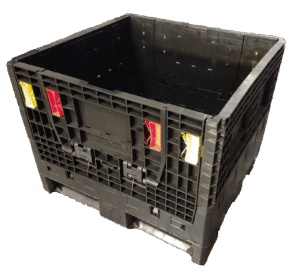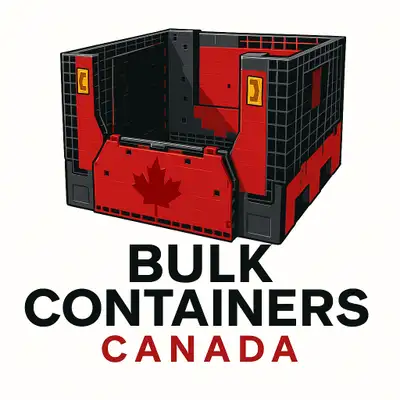Why used bulk containers are reliable for large-scale material management
Wiki Article
The Ultimate Overview to Picking the Right Mass Containers for Your Service Needs
Picking the ideal bulk containers is critical for any kind of service that counts on effective logistics. Different sorts of containers exist, each developed for details products and applications. Variables such as size, product compatibility, and regulative requirements play a substantial role in this decision-making procedure. Understanding these aspects can bring about enhanced functional efficiency. Nevertheless, several companies overlook crucial aspects that can boost their overall efficiency and sustainability. What are these factors to consider?Recognizing Various Sorts Of Mass Containers
Bulk containers work as essential devices for services looking for efficient storage and transportation remedies. These containers come in numerous kinds, each made to meet specific operational needs. One usual kind is the intermediate mass container (IBC), which is optimal for fluid and granulated products, supplying a balance of capacity and ability to move. Another prominent option is the mass bag, or FIBC, suitable for dry, flowable items. These flexible containers are lightweight and can be conveniently delivered and kept. For heavier products, inflexible mass containers are commonly used, supplying longevity and stability for safe handling. Additionally, there are specific containers customized for unsafe products, making certain conformity with safety and security laws. Understanding the distinct characteristics of these bulk container types enables businesses to make enlightened decisions that enhance logistics and lower costs. By choosing the best container, business can enhance their functional effectiveness and enhance their supply chain procedures.Trick Product Factors To Consider for Mass Containers
When picking bulk containers, it is necessary to contemplate the products used in their construction. Variables such as toughness, chemical, and sturdiness compatibility play a critical function in guaranteeing the containers fulfill particular functional demands. Additionally, weight and transportability issues can influence both efficiency and transport logistics.Material Toughness and Strength
Resilience and strength are essential aspects in selecting materials for bulk containers, as they straight influence the container's ability to endure various ecological problems and dealing with procedures. Products such as high-density polyethylene (HDPE), polypropylene, and stainless-steel are frequently preferred for their durable residential or commercial properties, supplying resistance to abrasion, temperature level, and effect changes. The option of material likewise affects the general lifespan of the container; more powerful materials generally lead to much less constant replacements, bring about set you back financial savings gradually. In addition, the weight of the material can influence shipping costs and convenience of handling. Businesses need to consider their certain functional environments and the possibility for deterioration to guarantee peak sturdiness and strength in their mass container choice.Chemical Compatibility Factors
Recognizing chemical compatibility is important for choosing mass containers, as the materials utilized have to stand up to the certain substances they will certainly hold. Various aspects influence compatibility, consisting of the chemical nature of the materials, temperature level, and period of storage. Corrosive chemicals might require containers made from stainless steel or specialized plastics that stand up to degradation. Furthermore, reactive materials can create heat or gases, necessitating vented or pressure-rated containers. The choice of container product, whether polyethylene, polycarbonate, or metal, should straighten with the chemical homes of the kept compounds to avoid breaches or leakages. Inevitably, an extensive analysis of these compatibility elements guarantees secure handling and storage, securing both employees and the setting while keeping item stability.Weight and Mobility Problems
Selecting bulk containers includes not only evaluating chemical compatibility but additionally considering weight and portability. Businesses must assess the convenience of handling and transport to enhance performance. Lightweight materials like high-density polyethylene (HDPE) or light weight aluminum can help with simpler movement and lower delivery prices. Conversely, heavier containers might provide boosted sturdiness but can hinder movement, especially in environments needing constant relocation. Furthermore, the layout of the container ought to permit hassle-free training and piling, making sure ergonomic safety and security for employees. Business should likewise think about the framework readily available for transportation; for instance, containers compatible with forklifts or pallet jacks can improve operations. Ultimately, the ideal equilibrium between weight and portability straight affects functional performance and price efficiency.Sizing Your Mass Containers for Optimal Effectiveness
When sizing mass containers, companies need to meticulously examine the measurements called for to accommodate their details products. Furthermore, weight capacity is an important variable that affects performance and safety and security during transport and storage space. Reliable sizing not only makes best use of room however also enhances functional process.Establishing Container Capacities
Selecting the right dimensions for bulk containers is vital for optimizing efficiency in storage and transport. Companies have to analyze their certain needs, taking into consideration elements such as offered space, the nature of the items being saved, and the methods of transportation made use of. Exact measurements assure that containers fit ideally in automobiles and storehouses, decreasing squandered space and decreasing handling time. Criterion dimensions can offer benefit, however custom measurements could be essential for one-of-a-kind requirements or to accommodate certain items. In addition, it is essential to examine piling capabilities and availability, as these variables affect overall operational effectiveness. Inevitably, the ideal dimensions lead to boosted company and structured logistics, profiting the general productivity of the company.Weight Ability Considerations
Recognizing weight capacity is crucial for organizations intending to enhance their mass container effectiveness. The weight capacity of a container straight influences storage abilities, transport logistics, and total functional costs. Choosing containers with the proper weight restrictions assures that services can securely store and deliver their products without risking damages or conformity problems. Straining containers can lead to structural failings, while underutilizing capability results in wasted resources. When picking containers, it is essential for businesses to assess their item weights and think about any kind of regulative demands. In addition, variables such as the kind of product, intended usage, and ecological problems must likewise influence weight ability choices. By examining these components, businesses can boost effectiveness and ensure a streamlined supply chain.Regulatory Compliance and Security Requirements

Governing conformity and safety requirements play an important role in the choice of bulk containers for businesses. Organizations needs to ensure that their containers meet numerous laws set by local, nationwide, and global authorities. These standards often relate to product safety and security, architectural integrity, and appropriate labeling, which help avoid accidents and ensure the risk-free transportation of products.
Furthermore, adherence to industry-specific standards, such as those from the Food and Drug Management (FDA) or the Occupational Security and Wellness Administration (OSHA), is vital for firms handling hazardous materials or food items. Non-compliance can lead to penalties, legal concerns, or damage to an organization's online reputation.
Companies need to also take into consideration the container's compatibility with the products being kept or carried to stay clear of contamination or chemical responses (used bulk containers). To sum up, understanding and executing governing compliance and safety standards is vital for the liable and efficient use bulk containers
Sustainability Choices for Eco-Friendly Mass Containers

Companies are likewise checking out options made from recycled products, which not just preserve sources however likewise sustain the reusing sector. Furthermore, technologies in layout permit lighter containers that need less energy to transport, better boosting sustainability. By incorporating these environment-friendly bulk container alternatives, organizations can demonstrate their dedication to ecological stewardship while meeting customer demand for lasting practices. This shift not only aids the planet however can likewise improve brand name online reputation and consumer commitment.
Cost-Effectiveness and Budgeting for Bulk Containers
While several organizations concentrate on sustainability, cost-effectiveness continues to be an essential factor when selecting mass containers. Organizations must examine the preliminary acquisition cost, as well as long-term operational prices, to guarantee financial practicality. Variables such as longevity, upkeep, and reusability play a significant function in identifying general expenses.Spending in top quality containers may produce greater in advance prices however can bring about savings through lowered substitute prices and decreased waste. Furthermore, services ought to consider transportation expenses and storage performance, as these can affect the general budget plan.

Often Asked Questions
Exactly how Do I Establish the Right Container for Hazardous Products?
To establish the right container for hazardous materials, one should review compatibility with the material, think about the container's material, look for regulatory conformity, and assess capability and safety attributes to guarantee proper handling and storage space.Can Bulk Containers Be Custom-made for Details Products?
Yes, bulk containers can be tailored for certain items. used plastic containers. Various attributes, such as design, size, and material, can be customized to satisfy one-of-a-kind needs, guaranteeing suitable safety and efficiency for transporting and storing various goodsWhat Is the Average Life Expectancy of Different Mass Container Types?
The ordinary life-span of bulk container kinds differs; plastic containers last 5-10 years, steel containers 10-20 years, and wooden containers typically last 3-7 years, depending upon use, maintenance, and environmental problems.Just how Should I Clean and Maintain Bulk Containers?
To clean and keep bulk containers, one ought to frequently inspect for damage, remove deposit, clean with suitable detergents, wash thoroughly, and warranty correct drying out prior to storage. Following maker guidelines enhances durability and safety during use.Are There Rental Options for Bulk Containers Available?
Yes, numerous companies supply rental options for bulk containers, providing versatility for companies. These leasings can suit various demands, allowing firms to handle stock successfully without the dedication of purchasing containers outright.Durability and strength are critical factors in choosing materials for mass containers, as they directly affect the container's capability to stand up to different ecological conditions and managing procedures. Understanding chemical compatibility is used collapsible containers necessary for choosing mass containers, as the products utilized must resist the particular compounds they will hold. Understanding weight capacity is essential for businesses intending to maximize their bulk container efficiency. Regulatory compliance and safety and security requirements play an essential function in the option of mass containers for services. While numerous services focus on sustainability, cost-effectiveness stays an essential factor when selecting mass containers.
Report this wiki page